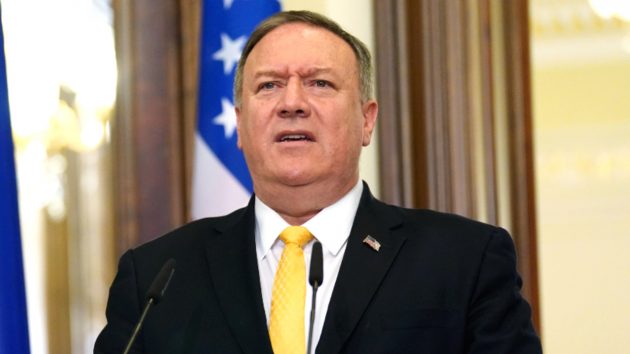At a meeting for U.S. state officials, Secretary of State Mike Pompeo warned about China’s influence seeping into local politics.
“It’s [China] assessed our vulnerabilities, and it’s decided to exploit our freedoms to gain advantage over us at the federal level, the state level, and the local level,” Pompeo said during a Feb. 8 speech given at the National Governors Association meeting held in Washington, D.C.
“Competition with China is not just a federal issue,” Pompeo added. “It’s happening in your states with consequences for our foreign policy.”
The State Secretary listed several examples of such efforts from Beijing.
He said China’s Consul General in New York City sent a letter last month to the speaker of the legislature in an unnamed state.
Quoting from the letter, Pompeo said the Chinese diplomat asked that U.S. officials “avoid engaging in any official contact with Taiwan,” such as “sending congratulatory messages to the electeds” and “inviting officials in Taiwan to visit the United States.”
Pompeo said the letter illustrated how a Chinese diplomat could urge an American elected official that he “shouldn’t exercise his right to freedom of speech.”
China considers Taiwan a renegade province that must be united with the mainland, with military force if necessary.
In order to diminish Taiwan’s standing as a sovereign state, Beijing has criticized foreign governments for being friendly with Taiwanese government officials, and blocked the island from joining international organizations such as the World Health Organization.
The United States, meanwhile, is Taiwan’s chief ally. After President Tsai Ing-wen won reelection in a landslide victory in January, Pompeo and dozens of U.S. lawmakers sent congratulatory messages.
Taiwan’s Vice President-elect William Lai is visiting the United States from Feb. 3 to 8. He took part in the annual National Prayer Breakfast in Washington on Feb. 6.
Pompeo also mentioned that a Chinese regime-backed think tank in Beijing produced an assessment report last year, ranking U.S. governors as “friendly, hardline, or ambiguous” in terms of their attitudes toward China.
He urged state officials to be on their guard: “Competition with China is happening inside of your state, and it affects our capacity to perform America’s vital national security functions.”
As an example, Pompeo pointed out that the Florida Retirement Systems, one of the largest public pension funds in the United States, is a major investor of Hikvision, a Chinese manufacturer of surveillance equipment that supplies gear to Chinese authorities in Xinjiang for monitoring Muslim minorities.
In addition, California’s pension funds have invested in companies that supply China’s military, according to Pompeo, though he did not name the firms.
In October 2018, the U.S. government blacklisted 20 Chinese public security bureaus and eight Chinese companies—including Hikvision—for contributing to human rights abuses in Xinjiang.
Following the blacklist, a spokesperson with Florida Retirement Systems told Reuters that it was working with external money managers to meet all regulatory requirements.
Pompeo also warned governors about the Chinese regime’s efforts to influence the U.S. education system.
“Chinese Communist Party officials, too, are cultivating relationships with county school board members and local politicians—often through what are known as sister cities programs,” Pompeo said. A number of major American cities, such as Chicago, Los Angeles, Houston, and Washington D.C., have such partnership programs with Chinese cities.
China has established Confucius Institutes in U.S. colleges, in addition to 519 “Confucius Classrooms” set up at American schools that teach kindergarten to grade 12.
In recent months, following U.S. officials’ warnings that such institutes engage in academic censorship, many colleges have shut down Confucius Institutes. Schools in 25 states are in the process or already have shut down these programs after conducting internal reviews, according to Pompeo.
“Don’t lose sight of the competition from China that’s already present in your state. Let’s all rise to the occasion and protect our security, our economy; indeed, all that we hold dear, all of those freedoms,” Pompeo concluded.
From The Epoch Times


